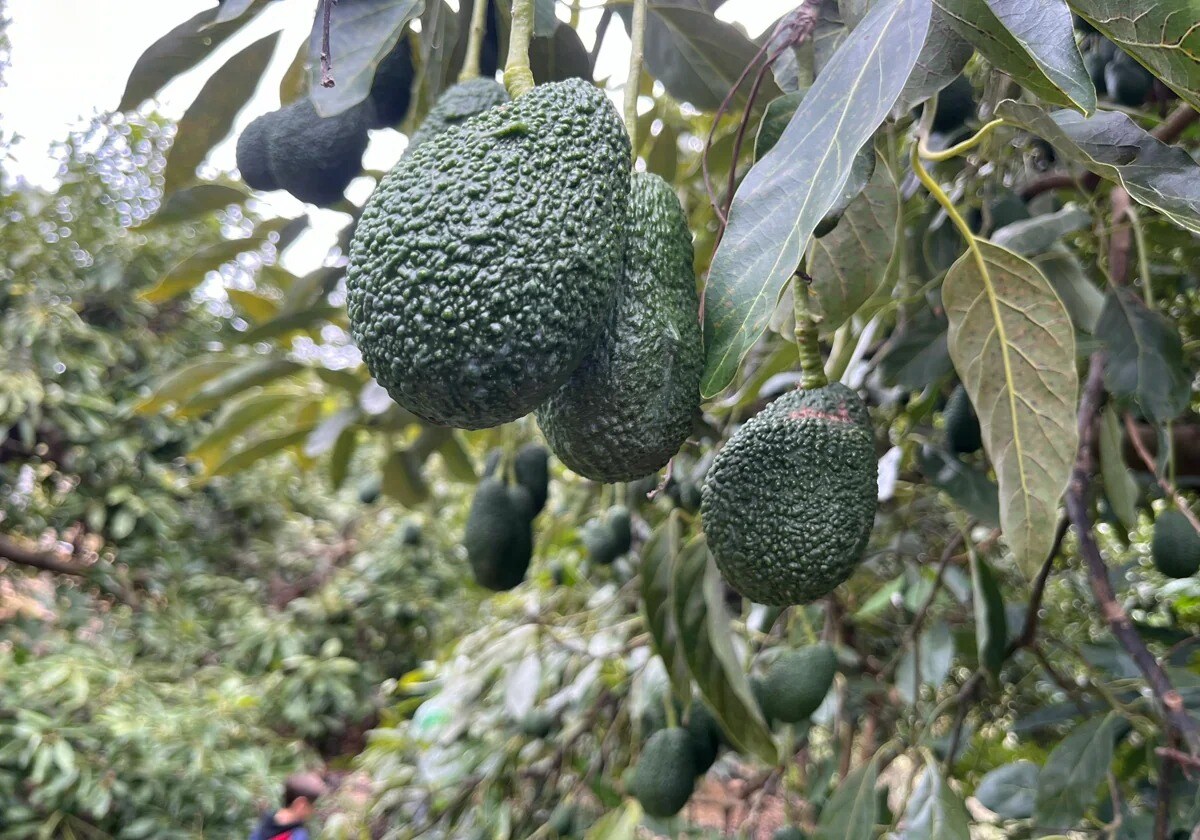Environmentalists warn against the 'agricultural extractivism' of Malaga’s subtropical crops
GENA-Ecologistas en Acción has criticised the planting of avocados and mangoes in places with low rainfall, as well as their impact on soil erosion, the breakdown of traditional farming models and job insecurity
Eugenio Cabezas
Axarquía
Friday, 13 September 2024, 08:23
The cultivation of subtropical crops in Malaga and Granada is suffering at the hands of the extreme drought that has plagued the provinces for the last five years. Not even the heavy investment in water infrastructures put in place by the Andalusian regional government, with an investment of more than 300 million euros, is preventing the loss of thousands of hectares of avocado trees and as summer ends, farmers can only hope and pray that this autumn will bring the long-awaited rains.
In this context, environmentalists from the Ecologistas en Acción group in Malaga province have once again hit out at the agricultural model that they consider ‘hyper-intensive’ and which has, in their opinion, ‘serious socio-environmental impacts. Their chief concern is the depletion of water resources as well as soil erosion and the destruction of traditional agricultural models based on family-run farms “that are increasingly dependent on or subject to the influence of investment into agriculture’.
These are the main conclusions of the new chapter, ‘La provincia de Málaga y Granada: extractivismo agrario para el cultivo de frutas tropicales’ (the province of Malaga and Granada: agricultural extractvism for the cultivation of subtropical fruits), of the report ‘El verdadero precio de los alimentos. (the true price of foods, the hidden face of agribusiness in the Iberian Peninsula)' which Ecologistass en Acción presented for the first time in April 2024.
Widespread phenomenon
This new chapter which they published on Wednesday 11 September covers the case of avocado cultivation in these provinces and how it is affecting areas with a great biodiversity that are protected on paper, such as rivers and wetlands. “However, the expansion of intensive avocado cultivation is a widespread phenomenon that is increasingly being observed in other regions of the Iberian peninsula, including the Campo de Gibraltar in the province of Cadiz,” the environmentalists said in a statement.
The environmental group estimates that between 30% and 40% of the total irrigated area of 12,989.96 hectares in 2017 in the Axarquía area to the east of Malaga province are illegal plantations. “These plantations exceeded the surface area of the Guaro Plan by more than 140 metres thanks to the profusion of illegally opened wells and the resale of water by growers’ communities,” the report says.
It also notes that the irrigated area has continued to grow, even in the middle of a drought, so that the whole area, legal and illegal, is currently around 15,000 hectares, according to statements by the Junta de Andalucía.
In fact, over the last 50 years there has been an expansion in tropical crops, especially in the Axarquía. But it was after the financial crisis of 2008 when a lot of land and traditional crops such as olives and muscat grapes were changed in favour of the cultivation of avocados and mangoes, given the good price, high demand and the growing trend in eating this ‘superfood’ throughout Europe in recent years. France, followed by the Netherlands and Germany, are at the top of the list of avocado importing countries.
Water footprint
As for the requirements for avocado cultivation, the report shows how studies on the avocado's water footprint have shown that 350.5 litres of water are needed to produce a fruit with an average weight of 350 grams. Thus, while the temperatures on the Andalusian coastline might be ideal for this type of crop, the reduced rainfall cannot possibly meet demand, according to the environmentalists and is being “aggravated by the climate crisis”.
In addition, they argue that the depletion of water resources is affecting the public water supply to the local population, “which has been confronted with water cuts of up to 12 hours” in recent years. Added to this, according to the environmentalists, is ‘the ecological problem of huge earth movements during cultivation with heavy machinery and soil erosion caused by deforestation of hillsides for crop cultivation, which is aggravated by extreme weather events such as torrential rains’. The report notes that this soil degradation “favours the progressive leaching of mineral salts, which worsens soil quality and increases the need for fertilisers, accentuating the region's intensive agro-industrial system”.
On the other hand, the data collected in the report show that this agro-industrial model “fosters economic inequalities in the producing areas and does not favour job creation: average incomes in agricultural areas are among the lowest in Spain,” the report argues. According to Ecologistas en Acción, the lowest income is 7,972 euros per person per year in the Axarquía village of Moclinejo, and 7,625 euros per year on the coast of Granada, in the town of Albuñol.
Employment
In terms of employment, it is estimated that one person is employed for every five hectares of avocados per year. In contrast, open field vegetable cultivation employs around 15 people for every five hectares. “This example shows that the agro-industrial model not only creates fewer jobs, but also concentrates the economic benefits, so that only a minimal part benefits the local economy and associated rural development,” the report says.
In light of the data obtained in the report, Ecologistas en Acción has said that it is “essential to transform the current global agri-food model for one that is healthier, fairer, more sustainable and local: agroecological, in short”.
Biologist Rafael Yus, spokesperson for GENA-Ecologists in Action, stated, “It is necessary to diversify crops, promote dry farming in these areas, improve irrigation efficiency through techniques such as underground irrigation, use varieties with low water demand, forest the slopes of crops with native shrubs and ensure the ecological flow corresponding to the rivers.”
